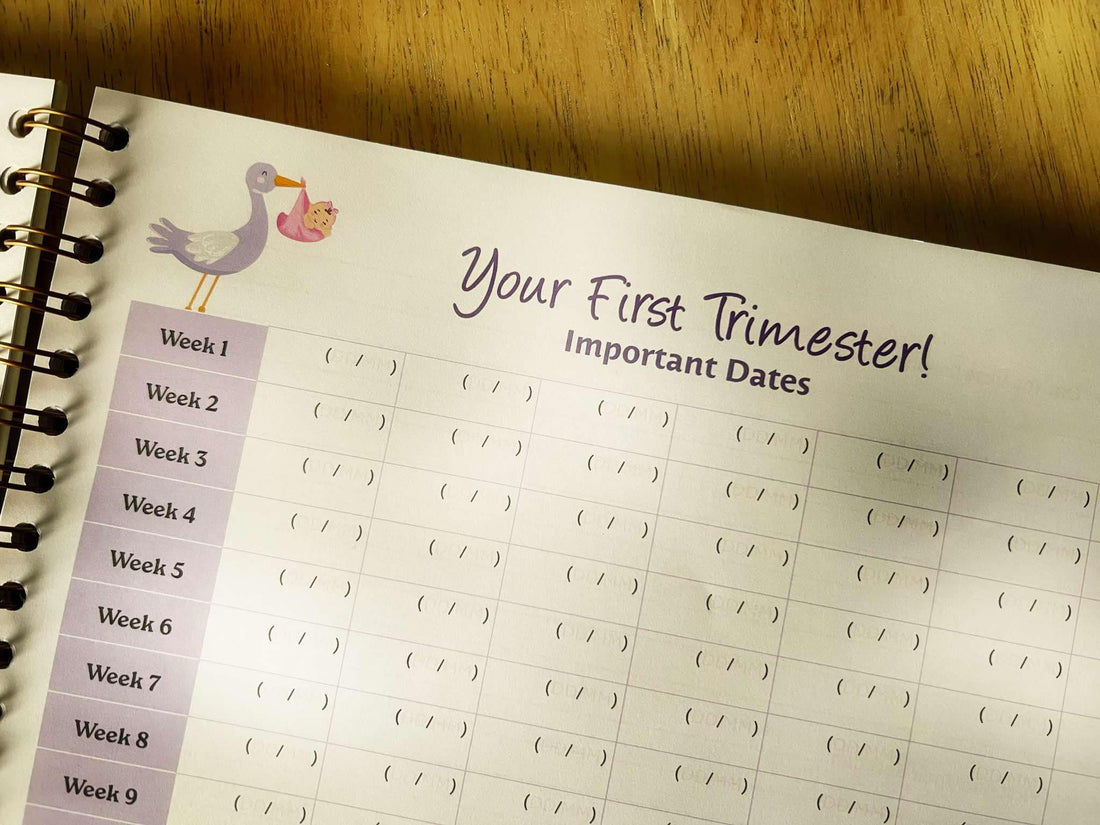
The First Trimester: What to Expect (And How to Document It)
Share
The first trimester of pregnancy is an exciting, yet challenging time. It's the beginning of an incredible journey, but it often comes with its fair share of physical and emotional changes. From early pregnancy symptoms like morning sickness and fatigue to the joy of hearing your baby’s heartbeat for the first time, this trimester is filled with moments you’ll want to remember.
Journaling during these early months can help you reflect, process, and stay grounded as you navigate this transformative period. Here’s a guide to what you can expect during the first trimester, and how to document your experience to make the most of this special time.
Early Pregnancy Symptoms: What to Expect
The first trimester is when your body begins to adapt to pregnancy, and this often brings about some common symptoms. These can include:
-
Morning Sickness: This isn’t just confined to the morning—many women experience nausea throughout the day. While it can be unpleasant, it’s often a sign that your body is adjusting to the hormonal changes of pregnancy.
-
Fatigue: The surge of hormones and the physical demands of early pregnancy can leave you feeling drained. It’s common to feel more tired than usual, even after a good night’s sleep.
-
Mood Swings: Hormonal fluctuations can lead to unpredictable mood swings. You might feel elated one moment and tearful the next, and that’s completely normal.
Journaling about these symptoms not only helps you keep track of the changes happening in your body, but it can also provide emotional relief as you process the challenges of early pregnancy. Writing about your experiences can help you make sense of what’s happening, and offer a safe space to express your emotions without judgment.
Milestones to Look Out For
The first trimester is also filled with exciting milestones, even though your baby is still in the early stages of development. Some key moments to look forward to include:
-
First Ultrasound: Around the 8-10 week mark, you may have your first ultrasound. Seeing your baby for the first time can be a deeply emotional experience, making it a moment worth documenting.
-
Hearing the Heartbeat: Many expectant parents hear their baby’s heartbeat for the first time during the first trimester. It’s a magical moment that marks the first tangible connection to the life growing inside you.
These milestones can be overwhelming in the best way, and journaling about them allows you to hold onto those memories. You can describe your emotions, the details of the experience, and your hopes for the future as you embark on this new chapter.
How Journaling Can Help You Cope
The first trimester can feel like a rollercoaster of emotions and changes, and journaling offers a wonderful way to cope. It helps you process the physical discomfort and emotional highs and lows, and allows you to reflect on your journey as you go.
-
Track Physical Changes: Record how you’re feeling physically—whether you’re experiencing nausea, fatigue, or other pregnancy-related symptoms. This can help you monitor your progress and make adjustments as needed (like taking more rest if you’re feeling exhausted).
-
Reflect on Emotional Shifts: Pregnancy can bring on a wide range of emotions, from excitement to anxiety. Writing about these feelings can help you better understand and manage them, making it easier to stay calm and centered.
-
Create Space for Growth: Journaling offers a chance to reflect on your personal growth during this time. With each passing day, your body changes, and your emotional landscape shifts. Writing about your experience can help you track those changes and celebrate your progress.
How to Use Your Journal to Track Changes and Feelings
A pregnancy journal isn’t just for recording milestones—it’s a tool that helps you stay present and mindful of the changes happening in your body and emotions. Here are a few ways you can use your journal during the first trimester:
-
Daily or Weekly Entries: Take a few moments each day or week to jot down how you're feeling. You could write about your physical symptoms, your emotional state, or even what’s on your mind. This gives you a chance to reflect and stay connected to yourself throughout the first trimester.
-
Gratitude Prompts: Even on tough days, there’s always something to be grateful for. Try adding a gratitude section to your journal where you write down one or two things you're thankful for each day. This can help you stay grounded and positive.
-
Tracking Milestones: Write down the special moments—your first ultrasound, the first time you hear your baby’s heartbeat, or the day you share your pregnancy news with loved ones. These moments are the building blocks of your pregnancy journey, and documenting them makes them all the more meaningful.
In Conclusion
The first trimester of pregnancy is filled with excitement, challenges, and profound changes. Journaling offers a way to track those physical and emotional shifts while helping you reflect, process, and stay connected to yourself. By writing about your experiences, you can better navigate the ups and downs of this transformative time and create lasting memories that will help you through the entire pregnancy journey.
Start documenting your first trimester today with My Pregnancy Journal—a thoughtful companion to help you reflect, track your progress, and nurture your well-being during this special time. Make this journey even more meaningful by capturing every moment.
